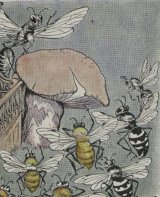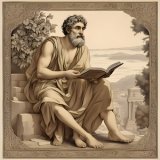The Bees and Wasps, and the Hornet
"The Bees and Wasps, and the Hornet" is not a book but one of Aesop's Fables that tells the story of a time when the bees and wasps lost their wits and decided to go to the hornet for advice. Through intriguing storytelling, Aesop delivers an important lesson about understanding one's role and not trying to camouflage one's identity falsely. This fable subtly teaches readers about the importance of self-acceptance and authenticity.
A store of honey had been found in a hollow tree, and the Wasps declared positively that it belonged to them. The Bees were just as sure that the treasure was theirs. The argument grew very pointed, and it looked as if the affair could not be settled without a battle, when at last, with much good sense, they agreed to let a judge decide the matter. So they brought the case before the Hornet, justice of the peace in that part of the woods. When the Judge called the case, witnesses declared that they had seen certain winged creatures in the neighborhood of the hollow tree, who hummed loudly, and whose bodies were striped, yellow and black, like Bees. Counsel for the Wasps immediately insisted that this description fitted his clients exactly. Such evidence did not help Judge Hornet to any decision, so he adjourned court for six weeks to give him time to think it over. When the case came up again, both sides had a large number of witnesses. An Ant was first to take the stand, and was about to be cross-examined, when a wise old Bee addressed the Court. "Your honor," he said, "the case has now been pending for six weeks. If it is not decided soon, the honey will not be fit for anything. I move that the Bees and the Wasps be both instructed to build a honey comb. Then we shall soon see to whom the honey really belongs." The Wasps protested loudly. Wise Judge Hornet quickly understood why they did so: They knew they could not build a honey comb and fill it with honey. "It is clear," said the Judge, "who made the comb and who could not have made it. The honey belongs to the Bees." Ability proves itself by deeds.
Translation
Translate and read this book in other languages:
Select another language:
- - Select -
- 简体中文 (Chinese - Simplified)
- 繁體中文 (Chinese - Traditional)
- Español (Spanish)
- Esperanto (Esperanto)
- 日本語 (Japanese)
- Português (Portuguese)
- Deutsch (German)
- العربية (Arabic)
- Français (French)
- Русский (Russian)
- ಕನ್ನಡ (Kannada)
- 한국어 (Korean)
- עברית (Hebrew)
- Gaeilge (Irish)
- Українська (Ukrainian)
- اردو (Urdu)
- Magyar (Hungarian)
- मानक हिन्दी (Hindi)
- Indonesia (Indonesian)
- Italiano (Italian)
- தமிழ் (Tamil)
- Türkçe (Turkish)
- తెలుగు (Telugu)
- ภาษาไทย (Thai)
- Tiếng Việt (Vietnamese)
- Čeština (Czech)
- Polski (Polish)
- Bahasa Indonesia (Indonesian)
- Românește (Romanian)
- Nederlands (Dutch)
- Ελληνικά (Greek)
- Latinum (Latin)
- Svenska (Swedish)
- Dansk (Danish)
- Suomi (Finnish)
- فارسی (Persian)
- ייִדיש (Yiddish)
- հայերեն (Armenian)
- Norsk (Norwegian)
- English (English)
Citation
Use the citation below to add this book to your bibliography:
Style:MLAChicagoAPA
"The Bees and Wasps, and the Hornet Books." Literature.com. STANDS4 LLC, 2025. Web. 22 Feb. 2025. <https://www.literature.com/book/the_bees_and_wasps%2C_and_the_hornet_2388>.








Discuss this The Bees and Wasps, and the Hornet book with the community:
Report Comment
We're doing our best to make sure our content is useful, accurate and safe.
If by any chance you spot an inappropriate comment while navigating through our website please use this form to let us know, and we'll take care of it shortly.
Attachment
You need to be logged in to favorite.
Log In